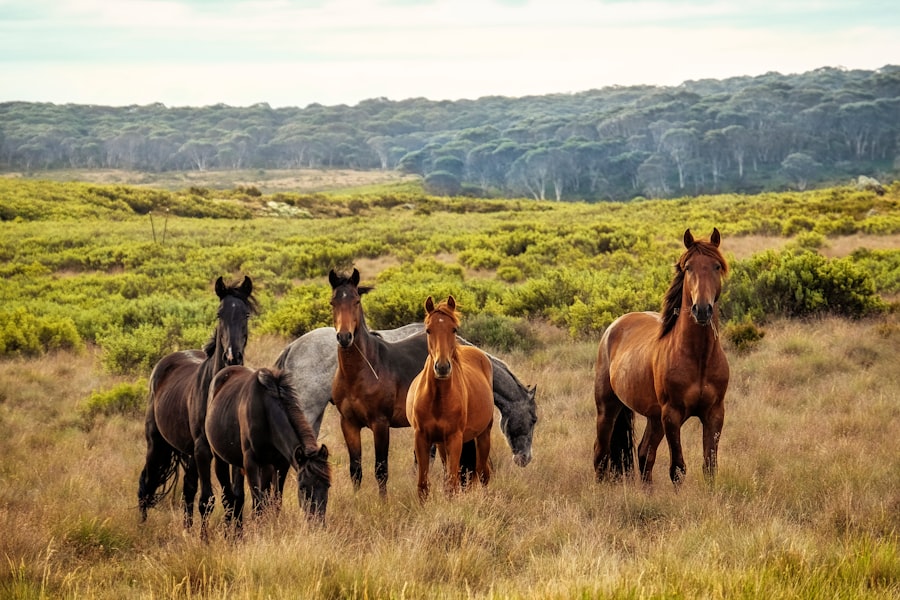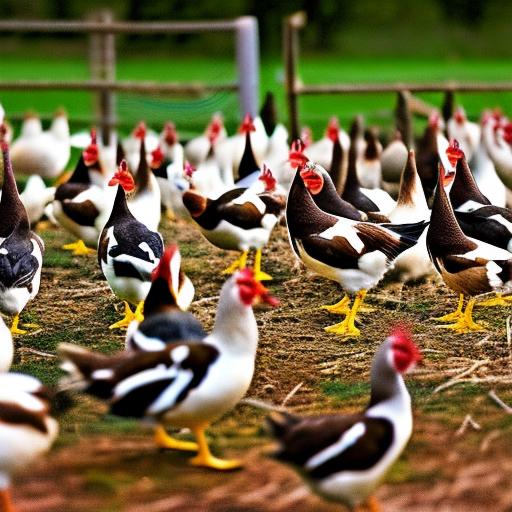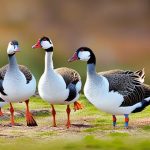Keeping chickens, ducks, and geese together can be a rewarding and enjoyable experience for poultry enthusiasts. These birds not only provide fresh eggs and meat, but they also offer natural pest control, fertilizer for your garden, and entertainment value. Personally, I have found that keeping these birds together creates a harmonious and diverse flock that adds beauty and interest to my backyard.
Key Takeaways
- Keeping chickens, ducks, and geese together can be a great way to diversify your flock and enjoy the benefits of each species.
- Benefits of keeping these birds together include pest control, increased egg production, and social interaction.
- Understanding the unique needs of each species is important for their health and well-being.
- Choosing the right breeds for your flock can ensure compatibility and optimal egg production.
- Proper housing, feeding, and hygiene practices are essential for maintaining a healthy flock.
The Benefits of Keeping Chickens, Ducks, and Geese Together
One of the main benefits of keeping chickens, ducks, and geese together is natural pest control. Chickens are excellent at foraging for insects and other pests in the yard, while ducks are known for their love of slugs and snails. Geese, on the other hand, are great at keeping grass trimmed and can even deter larger pests like raccoons or foxes. By allowing these birds to roam freely in your yard, you can significantly reduce the need for chemical pesticides.
Another benefit of keeping these birds together is the fertilizer they provide for your garden. Chickens, ducks, and geese produce manure that is rich in nutrients and can be used to fertilize your plants. By allowing them to roam in your garden or providing them with a designated area to deposit their droppings, you can create a natural and cost-effective fertilizer for your plants.
In addition to their practical benefits, chickens, ducks, and geese also offer entertainment value. Watching these birds interact with each other and explore their surroundings can be highly entertaining and enjoyable. They have unique personalities and behaviors that can provide endless amusement. Whether it’s watching chickens dust bathing or ducks splashing in a pond, these birds can bring joy and laughter to your daily life.
Understanding the Needs of Chickens, Ducks, and Geese
While keeping chickens, ducks, and geese together can be beneficial, it’s important to understand their individual needs and behaviors. Chickens, for example, are ground-dwelling birds that scratch and peck at the ground for food. They require a balanced diet of grains, vegetables, and protein-rich feed. Ducks, on the other hand, are waterfowl that enjoy swimming and foraging in water. They have a different diet that includes aquatic plants and insects. Geese are grazers that prefer grass and other vegetation.
Socialization is also important for these birds. Chickens are social animals that thrive in a flock environment. They establish a pecking order and need companionship to feel secure. Ducks are also social animals and prefer to be kept in pairs or small groups. Geese are highly social and form strong bonds with their flock mates. It’s important to provide ample space and opportunities for social interaction to ensure the well-being of these birds.
Choosing the Right Breeds for Your Flock
When choosing breeds for your flock, it’s important to consider factors such as temperament, egg production, and compatibility with other breeds. For beginners, it’s recommended to start with docile and easy-to-care-for breeds. Some popular choices for chickens include Rhode Island Reds, Sussex, and Orpingtons. For ducks, Pekin ducks and Khaki Campbells are good options. Embden geese and Toulouse geese are popular choices for beginners as well.
Compatibility between breeds is also an important consideration. Some breeds of chickens may be more aggressive or dominant than others, which can lead to conflicts within the flock. It’s important to choose breeds that have similar temperaments and sizes to ensure a harmonious flock. Additionally, some breeds of ducks or geese may not get along well with certain breeds of chickens. It’s important to do research and consult with experienced poultry keepers before introducing different breeds to your flock.
Housing Requirements for Chickens, Ducks, and Geese
Providing appropriate housing for your flock is essential for their health and well-being. The coop and run should be designed to accommodate the needs of chickens, ducks, and geese. The coop should be secure and predator-proof, with proper ventilation and insulation. It should also have nesting boxes and roosting bars for chickens to lay eggs and sleep.
Ducks and geese require access to water for swimming and cleaning. A small pond or kiddie pool can be provided for them to enjoy. The run should be spacious enough to allow for exercise and foraging. It’s important to provide adequate space for each bird, as overcrowding can lead to stress and aggression.
Feeding and Watering Your Flock

Feeding your flock the appropriate diet is crucial for their health and productivity. Chickens require a balanced diet that includes grains, vegetables, and protein-rich feed. Ducks have different dietary needs and require a diet that includes aquatic plants, insects, and commercial duck feed. Geese are grazers that prefer grass and other vegetation.
Watering requirements also differ between these birds. Chickens require fresh water at all times, while ducks and geese need access to water for swimming and cleaning. It’s important to provide clean water sources that are easily accessible to all birds.
To avoid waste, it’s recommended to use feeders and waterers that are designed specifically for poultry. These can help prevent spillage and contamination of the feed or water. It’s also important to monitor the amount of feed given to prevent overfeeding or underfeeding.
Health and Hygiene Considerations for Your Flock
Maintaining the health and hygiene of your flock is essential for their well-being. Common health issues in chickens include respiratory infections, parasites, and egg-laying problems. Ducks can be prone to respiratory infections, bumblefoot, and egg-binding. Geese may suffer from respiratory infections, foot problems, and egg-laying issues.
To prevent these health issues, it’s important to provide a clean and well-ventilated coop. Regular cleaning and disinfecting of the coop and nesting boxes can help prevent the spread of diseases. It’s also important to provide a balanced diet and access to fresh water. Regular check-ups by a veterinarian can help identify and address any health issues before they become serious.
Managing Egg Production from Your Flock
Managing egg production from your flock requires understanding their egg-laying cycles and providing appropriate conditions for laying. Chickens typically start laying eggs at around 5-6 months of age and will lay consistently for about 2-3 years. Ducks start laying eggs at around 5-7 months of age and can lay consistently for several years. Geese usually start laying eggs at around 2-3 years of age and can lay for many years.
Collecting and storing eggs properly is important to ensure their freshness and quality. Eggs should be collected daily and stored in a cool place, preferably in a refrigerator. It’s important to handle eggs gently to avoid cracking or damaging the shells.
To increase egg production, it’s important to provide a balanced diet, adequate lighting, and comfortable nesting boxes. Supplemental lighting can be used to extend the daylight hours and stimulate egg production during the winter months. Providing clean and comfortable nesting boxes can also encourage hens to lay eggs regularly.
Dealing with Behavioral Issues in Your Flock
Behavioral issues can arise in a flock of chickens, ducks, and geese, but there are solutions to address these problems. Aggression between birds can occur, especially during feeding time or when establishing a pecking order. Providing multiple feeding stations and ensuring that each bird has access to food can help reduce aggression.
Bullying and pecking order issues can also arise within the flock. It’s important to provide enough space and resources for each bird to establish their place in the hierarchy. If bullying becomes excessive, separating the aggressive bird temporarily or introducing new birds to the flock can help alleviate the problem.
The Joy of Keeping Chickens, Ducks, and Geese Together
Keeping chickens, ducks, and geese together can be a rewarding and enjoyable experience. The benefits of natural pest control, fertilizer for your garden, entertainment value, and cost-effectiveness make it a worthwhile endeavor. By understanding the needs of these birds, choosing the right breeds, providing appropriate housing and nutrition, and addressing any behavioral or health issues that may arise, you can create a harmonious and thriving flock. So why not give it a try and experience the joy of keeping these birds together in your backyard?
If you’re considering keeping chickens, ducks, and geese together, it’s important to understand the dynamics and requirements of each species. A helpful article on Poultry Wizard explores the topic in detail, providing insights on how to successfully house these birds together. From choosing the right location for your chicken coop, as discussed in their article on where to put a chicken coop, to understanding the specific needs of each bird, such as those highlighted in their article on chicken coop in Grand Island, NE, this resource offers valuable information for anyone interested in this unique combination. Additionally, if you’re curious about natural hatching processes and timelines, their article on how long it takes for chicken eggs to hatch naturally provides further insights into breeding chickens.
FAQs
What are the benefits of keeping chickens, ducks, and geese together?
Keeping chickens, ducks, and geese together can provide a variety of benefits, including pest control, increased egg production, and a more diverse and interesting backyard flock.
What are some important considerations when keeping these birds together?
It is important to ensure that all birds have access to appropriate food and water sources, as well as adequate space and shelter. Additionally, it is important to monitor the birds for any signs of aggression or illness.
Can chickens, ducks, and geese share the same coop?
While it is possible for these birds to share the same coop, it is important to ensure that the coop is large enough to accommodate all of the birds and that each species has its own nesting boxes and roosting areas.
What should I feed my chickens, ducks, and geese?
Each species has its own dietary requirements, so it is important to provide appropriate feed for each bird. Chickens typically require a diet high in protein, while ducks and geese require a diet that is higher in fat.
What are some potential challenges of keeping these birds together?
One potential challenge is that chickens may peck at the feet and legs of ducks and geese, which can lead to injury. Additionally, geese may be aggressive towards smaller birds, such as chickens.
Can I keep other types of birds with chickens, ducks, and geese?
It is generally not recommended to keep other types of birds, such as turkeys or quail, with chickens, ducks, and geese. These birds have different dietary requirements and may be more prone to disease when housed together.
Meet Walter, the feathered-friend fanatic of Florida! Nestled in the sunshine state, Walter struts through life with his feathered companions, clucking his way to happiness. With a coop that’s fancier than a five-star hotel, he’s the Don Juan of the chicken world. When he’s not teaching his hens to do the cha-cha, you’ll find him in a heated debate with his prized rooster, Sir Clucks-a-Lot. Walter’s poultry passion is no yolk; he’s the sunny-side-up guy you never knew you needed in your flock of friends!







